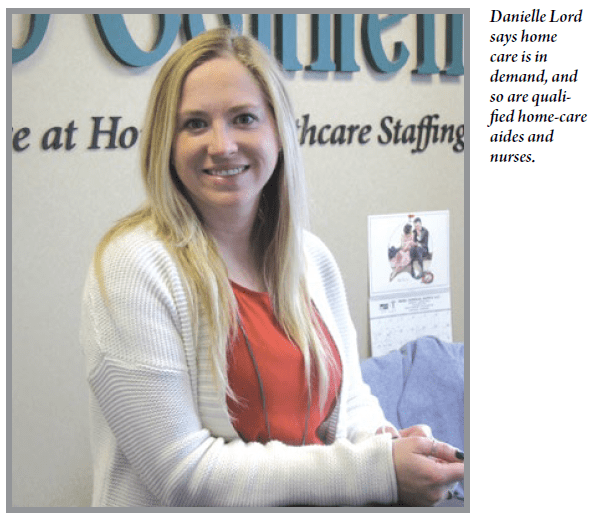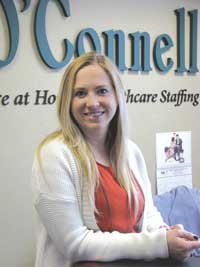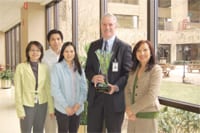Where the Heart Is – O’Connell Care at Home Tries to Keep Up with Soaring Demand
Growing up in Holyoke, Fran O’Connell lived with an extended family, including an elderly aunt and grandfather. In those days, the family took care of each other, in sickness or health; no one had heard of home care.
These days, as owner of O’Connell Care at Home in Holyoke, he helps other families take care of their loved ones at home, away from institutional settings, through a broad range of home-care services, in addition to nurse-staffing services for a variety of clients.
Almost three decades after he launched the enterprise in 1987, O’Connell continues to see steady growth in his business, and explosive growth in the home-care industry — growth that’s being held back only by a national shortage in qualified home health aides. That’s because, as people live longer than they used to, and with their caregivers and children (often one and the same) more aware than ever of the care options available to them, demand for home care and other nursing services is only expected to increase.
“Really, there’s such a need in the community for home care,” said Danielle Lord, the company’s vice president of operations, who essentially runs the company’s day-to-day activity. “As the population of Baby Boomers age, more want to stay at home — or where they’re currently at, maybe assisted or independent living — rather than go to a nursing home.”
Lord came on board in 2007 and has seen significant change since then, including a move to larger quarters on Bobala Road in Holyoke; the company plans to move again this year, from Holyoke to Springfield. In addition, it opened a South Deerfield office last year.
“We opened that office to better serve the Franklin County and northern Hampshire County areas. While doing that, we decided to move our Holyoke office to Springfield to better serve Hampden County and southern Hampshire County,” she explained. “Business has tripled in the last five to seven years. We are really growing; there’s such a need in the community. We still could probably grow more, but home health aides and qualified home healthcare workers are so in demand right now.”
That’s the key issue right now for home-care companies — one O’Connell is addressing through an ambitious array of job fairs, recruitment efforts, and in-house training, all with the goal of keeping more Western Mass. seniors living safely and happily at home.
Fertile Ground
Before starting the firm, Lord said, O’Connell was a nurse practitioner who had taken care of his own grandfather at home. After earning his nursing degree from Columbia University in 1984, he returned to Holyoke and discovered that several of his friends had caught the entrepreneurial bug and were opening their own businesses.
While most nurses worked at specific settings, such as hospitals, he simply incorporated himself and started selling himself as a nurse. “If someone needed a nurse for the day, or someone got out of the hospital and needed a private-duty nurse, I did that,” he explained. “Word got out quickly, and I couldn’t do every shift, so I started bringing in friends, and before long I had 10 people subcontracting for me.”
Someone pointed out that O’Connell was essentially running a temp agency, so he took the next step and employed his fellow nurses, and the business was on its way.
“There weren’t home-care services out there in the ’80s, so it started really as a staffing business, then gradually turned to home care,” Lord said — a shift that began when O’Connell started getting calls from the Holyoke Visiting Nurses Assoc. and other organizations that service seniors.
O’Connell found he loved home care, and went on to earn his master’s degree in nursing in 1996 and was later certified as a family nurse practitioner.
Home care encompasses myriad services, Lord said, from basic household help to medication management to transport to appointments. “Primarily, it’s all your activities of daily living, the things you need to do to stay at home. We do homemaking and meal preparation, help people get up, get dressed, take a shower, toileting, all those sort of things.”
Home-care companies typically offer a wide range of time commitments as well, she added. “It’s everything from two hours once a week to help get someone groceries, to around-the-clock care because someone can’t be left alone, for dementia or hospice, or someone who wanders and can’t be left alone. It’s really such a broad spectrum.”
And it’s not just the client who benefits from home care, she added, but their family as well. “We help people figure out how to stay home, where they want to be, but also support other family members. Especially if the husband or wife is declining, we can help the spouse, help the family around the house, make sure they’re not getting overwhelmed.”
The staffing piece of O’Connell Care at Home — such as its contract work with Highland Valley Elder Services and various VNA organizations — is different in some ways, Lord said. “We’re still doing home care in those situations, but they provide the clients and have care plans already written. If an adult day service needs a nurse, we’ll try to staff a nurse. On [student] field trips, we’ll provide a nurse for the day. If a VNA has somebody on vacation and they have higher census and need home health aide, we’ll provide that. So, yes, we do some staffing, but it’s primarily home care.”
Transportation is another facet of the company’s service. “That’s all private pay — we’ll take somebody to the doctor or a family event on the weekend or around the holidays,” she explained. “We’re very busy with that around Christmas; people call us and ask, ‘can you transport my mother to Christmas dinner and then home?’ We have a wheelchair van for that. It’s a popular service around those times.”
Training Days
In fact, all O’Connell’s services are becoming more popular, which keeps the pressure on to continually add more talent. That’s easier said than done, with Forbes and U.S. News & World Report both listing home-care aide as one of the most in-demand jobs in coming years. Simply put, there aren’t enough bodies to meet the need.
“We recruit all the time, and we frequently have job fairs for people interested in the job,” Lord said. “The need for home health aides hinders our growth. Other companies are dealing with the same thing; they’re all looking for qualified workers. I think that’s across the board. We’re fighting now with hospitals, nursing homes, assisted living, independent living, home care, nursing homes. But we’re willing to train our own people. If someone has an interest, we’ll train them. We want to put the best person out there to care for clients — the kind of people I’d want to take care of my own family.”
The reason strikes at the heart of why home care is so important, she went on. “We want to make sure families feel their loved ones are safe at home. We write a care plan for the people we take care of. We learn what this person likes, doesn’t like, and decide who’s the best person we can send. We try to match their interests and send someone they can form a relationship with. Home care aides can take care of people for years, in many cases. They become a really important part of the family and increase their quality of life.
“We’re not perfect at it,” she was quick to add. “We’re honest with people that the first person you get may not be a perfect match, but we’re going to find you someone you end up clicking with — someone they’ll look forward to seeing each day.”

Lord said O’Connell mainly hires people who have been trained as home health aides or CNAs, “but if there is somebody who has other kinds of experience and thinks this is something they want to do, someone who’s caring and compassionate and really wants to take care of older people — because we primarily do elder care — we can offer some training to get them up and running, to become a home health aide.”
Beyond the basics, though, “we’re looking for someone reliable, with good common sense, someone who’s going to get there in a snowstorm,” she went on. “We want someone really caring who considers the needs of their clients and really wants to take care of them and do what’s best for them. They care about the people they’re taking care of.”
O’Connell says he takes pride in seeing people come work for him as CNAs, then go on to get PN or LPN degrees and return as nurses. He stressed that it’s not an easy job, but as a career path, it can be rewarding and — important for job seekers these days — stable.
Lord agreed, and said families appreciate the stability of a reliable home-care nurse or aide.
“We do a lot of training and have a lot of supervision,” she said. “We meet the family, write a care plan, and try to be really thoughtful. We’re trying to make good matches and keep people where they should be — and improve their quality of life.”



Comments are closed.